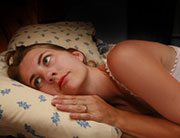- The Best Time of Day to Drink Bone Broth to Maximize Health Benefits
- 8 Ways to Increase Dopamine Naturally
- 7 Best Breads for Maintaining Stable Blood Sugar
- Gelatin vs. Collagen: Which is Best for Skin, Nails, and Joints?
- The Long-Term Effects of Daily Turmeric Supplements on Liver Health
- Could Your Grocery Store Meat Be Causing Recurring UTIs?
- Are You Making This Expensive Thermostat Error This Winter?
- Recognizing the Signs of Hypothyroidism
- 10 Strategies to Overcome Insomnia
- Could Artificial Sweeteners Be Aging the Brain Faster?
Insomnia May Raise Stroke Risk, Especially for Younger Adults


People plagued with insomnia might have an increased risk of stroke, particularly if they are young adults, a new, large study from Taiwan suggests.
Over the course of four years, researchers found that insomnia seemed to raise the likelihood that a person will be hospitalized due to stroke by 54 percent.
That risk skyrocketed for people between the ages of 18 and 34, who were eight times more likely to suffer strokes if they had insomnia when compared to their peers who got good sleep, the study found.
“We pay a lot of attention to high blood pressure, to obesity, to issues related to cholesterol. Those are known risk factors,” said Dr. Demetrius Lopes, director of the Interventional Cerebrovascular Center at Rush University in Chicago and a spokesman for the American Heart Association. “But I think what is underrated is if you don’t have a good sleep routine, how much it can harm you, especially at a young age.”
The new study compared randomly selected health records of more than 21,000 people with insomnia and 64,000 without insomnia in Taiwan. None had a previous diagnosis of stroke or sleep apnea.
The findings were published in the May issue of the journal Stroke.
During the four-year follow-up, 583 insomniacs and 962 non-insomniacs were admitted to a hospital for stroke. After accounting for other factors, the researchers concluded that the people with insomnia had an increased stroke risk compared with those who slept well.
Researcher Ya-Wen Hsu, at Chia Nan University, and colleagues also found that the amount of insomnia a person suffers had a direct bearing on their apparent stroke risk.
People who suffered persistent insomnia had a higher risk of stroke than people with intermittent insomnia, and both groups were at greater risk than people whose insomnia stopped during the study.
Insomniacs also tended to suffer more from risk factors that can lead to stroke, including diabetes, high blood pressure and high cholesterol.
While the study found an association between insomnia and higher stroke risk, it didn’t prove cause-and-effect.
“We’ve seen that people who have sleep issues have other health factors that increase their risk for stroke,” said Dr. Suzanne Steinbaum, a preventive cardiologist at Lenox Hill Hospital, in New York City. “This one behavioral issue, insomnia, has all these multiple factors associated with it that lead to an increased risk of stroke.”
But does insomnia increase these other risk factors, or does an unhealthy lifestyle that increases a person’s stroke risk also cause them to suffer insomnia?
It’s likely a little of both, said Dr. Mark Urman, an attending cardiologist at the Cedars-Sinai Heart Institute, in Los Angeles.
“It becomes a vicious cycle,” Urman said. “When you aren’t getting a good night’s sleep again and again, it can contribute to other risk factors like blood glucose levels and high blood pressure.” Those factors, in turn, promote further insomnia.
On the other hand, regular healthy sleep can be a boon to a person’s health, Rush University’s Lopes said. Sleep helps the body coordinate blood pressure, manage hormones and reduce stress, he noted.
“I think sleep is underrated in terms of its power, in how much healing occurs while you are sleeping,” Lopes said.
One thing is clear from the study — young adults are not as invincible as they might believe themselves to be, experts agreed. Late nights studying or partying could leave them at higher risk of being hospitalized for a stroke.
“No one gets a pass,” Lenox Hill’s Steinbaum said. “How we live our whole lives affects our cardiovascular health. It doesn’t just start at age 50 or 60. It starts from the beginning of your life.”
More information
For more about insomnia, visit the U.S. National Institutes of Health.
Source: HealthDay
Copyright © 2026 HealthDay. All rights reserved.










